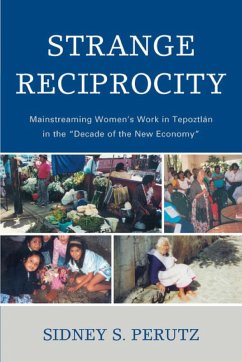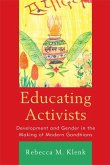"This time show us like we really are!" This mandate from Doña Clara, homemaker-market merchant in the community of Tepoztlán, makes explicit the dimensions of this concertedly empirical, multidisciplinary study of women's ways of using a neoliberal development model that systematically disadvantages them to create value and values. Members of one of the first New World populations to have their labor globally feminized, into the twenty-first century, Tepoztecas have continuously contrived to adjust organizationally to production-reproduction systems that use gender inequalities to be global. The many faceted work experiences and broad academic interests of the anthropologist/author uniquely equip her to demystify and give a history to women's work during the period of 1990 to 2000, a time of great transformation for Tepoztecas on the frontlines of massive economic, social, and political challenges for stakeholders. The "strange reciprocity" disaggregated as worksite exchanges of valued things is women's ways of turning to their advantage the very ideologies and technologies that simultaneously make them central to Free Market capitalism while constraining their access to resources that can be exchanged at prices set by and for awesomely powerful interests-or not. Nevertheless, Strange Reciprocity qualitatively and quantitatively confirms that as Tepoztecas construct small economies against the grain of what take over agendas seem to have in mind for them, they are structurally adjusting the big economies of the winners.
Strange Reciprocity analyzes the special impact of the New Economy in shaping women's work and the reciprocal effect of how this adaptation strengthens and validates the extreme exploitation that women experience. -- June Nash, City University of New York Anthropologist Sidney S. Perutz's Strange Reciprocity: Mainstreaming Women's Work in Tepoztlan in the 'Decade of the New Economy' is an extensive and detailed ethnographic study... The author's rich observations of women's and men's activities in the context of the household and the national economy make this a feminist ethnography of interest to advanced doctoral students versed in cultural theory and professionals of all disciplines concerned with feminist analysis of paid and unpaid labor. Feminist Economics, January 2010 This is a multi-faceted study with several layers of context, including a historical context that is sustained and well done, especially for the twentieth century. All of the facets Sidney Perutz pursues are addressed seriously and well in both descriptive and interpretative ways. -- William B. Taylor, University of California, Berkeley An extensive and detailed ethnographic study of Tepoztlan...the author's rich observations of women's and men's activities in the context of the household and the national economy make this a feminist ethnography of interest to advanced doctoral students versed in cultural theory and professionals of all disciplines concerned with feminist analysis of paid and unpaid labor. Feminist Economics, January 6, 2010









